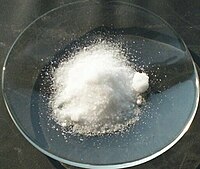
Photo from wikipedia
High-salt intake is one of the major dietary determinants of increased blood pressure and cardiovascular disease. Thus, there is scientific and medical interest in understanding the mechanistic abnormalities mediating the… Click to show full abstract
High-salt intake is one of the major dietary determinants of increased blood pressure and cardiovascular disease. Thus, there is scientific and medical interest in understanding the mechanistic abnormalities mediating the pressor effects of salt (salt sensitivity). According to historical theory, salt sensitivity stems from an impairment in renal function (referred to as “abnormal pressure natriuresis” or a “natriuretic handicap”), which causes salt-sensitive subjects to excrete a sodium load more slowly, and retain more of it than salt-resistant normotensive controls. However, this historical view has come under intense scrutiny because of growing awareness that in salt-sensitive subjects, acute salt loading does not usually induce greater increases in sodium balance and cardiac output than those induced by salt loading in salt-resistant normotensive controls. Here we highlight pioneering studies from Japan that challenge the historical thinking and provide insights into a contemporary theory of salt sensitivity termed the “vasodysfunction theory.” According to this theory, initiation of salt-induced hypertension usually involves abnormal vascular resistance responses to increased salt intake, not greater renal retention of a salt load in salt-sensitive subjects than in normal subjects. By shifting the focus from the historical theory to a contemporary final common pathway for the pathogenesis of salt sensitivity, research from Japan is building the scientific foundation for more effective approaches to the prevention and treatment of salt-induced hypertension. Among the most promising approaches are dietary strategies for reducing the risk for salt-induced hypertension that do not depend on reducing salt consumption in the population.
Journal Title: Hypertension Research
Year Published: 2018
Link to full text (if available)
Share on Social Media: Sign Up to like & get
recommendations!